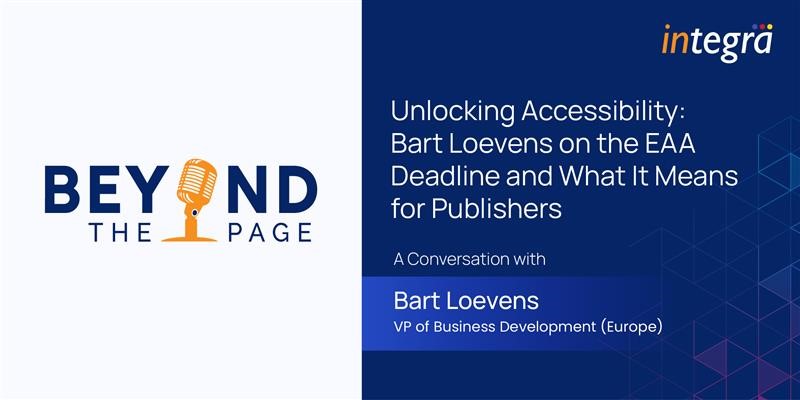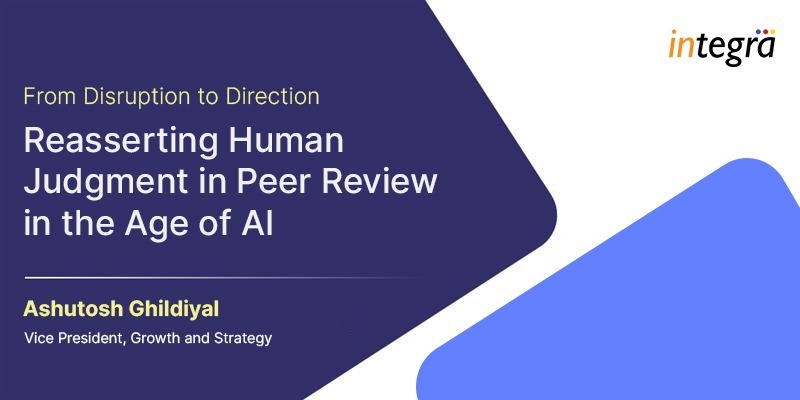Unlocking Accessibility: EAA Deadline and What It Means for Publishers

Beyond the Page – Thought Leadership, Insights, and Stories from the Heart of Integra
Welcome back to Beyond the Page! In this edition, we reconnect with Bart Loevens, Vice President – Business Development at Integra, to explore a pivotal regulatory milestone: the European Accessibility Act (EAA). Taking effect in June 2025, the EAA is driving publishers across Europe to ensure their digital content is fully accessible.
Bart shares how publishers are responding to this challenge, the critical role automation plays in scaling compliance, and how Integra is helping clients transform accessibility into a strategic opportunity.
The Urgency of EAA Compliance
Bart, with the EAA deadline fast approaching, what are you hearing from publishers in Europe?
Bart: There’s definitely a growing sense of urgency—especially among educational and scholarly publishers. Many now recognize that accessibility is not just a regulatory checkbox but a long-term strategy for inclusivity, discoverability, and growth.
At recent industry events, EAA compliance was a leading topic of conversation. Publishers are aiming to ensure that both newly published and backlist content meets the required standards. The challenge lies in scaling these efforts without disrupting production timelines or compromising quality.
Born Accessible vs. Remediating the Backlist
How are publishers balancing the need to create “born accessible” content with the complexities of remediating legacy content?
Bart: It’s really a two-track approach:
- Born accessible: Publishers are embedding accessibility from the ground up—structured content, tagged PDFs, alt text, and compliant file formats.
- Backlist remediation: This is often more challenging. Some publishers have decades of legacy content, and transforming it into accessible formats requires scale, precision, and strong planning.
At Integra, we support both pathways. Our accessibility-first production workflows ensure new content is compliant, while our large-scale remediation services combine automation with human QA to handle legacy content efficiently and accurately.
Automation as an Enabler
What role is automation playing in helping publishers meet EAA requirements?
Bart: Automation is a game-changer. Standards like WCAG 2.2 require consistent, meticulous application—something that’s difficult to manage manually at scale.
Our AI- and rule-based tools can:
- Identify and tag document structures like headings, lists, and tables
- Suggest alt text for images
- Check color contrast and reading order
- Convert files into accessible formats like EPUB3, HTML, and tagged PDFs
Combined with expert review, automation helps reduce turnaround times, lower costs, and ensure accuracy.
Importantly, our AI tools are designed and deployed responsibly—transparent, explainable, and aligned with data privacy and ethical standards—to ensure both compliance and trust.
Making the Business Case for Accessibility
Beyond regulatory pressure, how are publishers viewing accessibility from a business perspective?
Bart: The mindset is shifting. Where once it was seen as a compliance task, publishers now view accessibility as a strategic differentiator—especially in education and public sector procurement, where inclusive content is a key requirement.
It also boosts discoverability: accessible content is structured and semantically rich, which helps with SEO and search engine rankings across academic platforms.
And critically, it aligns with DEI initiatives—ensuring that content is usable and meaningful to all, including people with disabilities.
Integra’s Role in Supporting EAA Readiness
What specific solutions is Integra offering to help publishers prepare for the EAA?
Bart: We offer a comprehensive suite of services tailored to where each publisher is in their accessibility journey:
- Accessibility audits of content, workflows, and digital platforms
- Scalable remediation services combining automation and expert QA
- “Born accessible” production workflows integrated into editorial and design stages
- Training and consulting to build internal expertise
- Custom dashboards for tracking EAA compliance and progress
We’ve also set up dedicated teams for scholarly, educational, and corporate publishing—each bringing domain-specific insights and support.
Final Thoughts: Preparing for a More Inclusive Future
What advice would you offer to publishers who haven’t yet fully engaged with EAA compliance?
Bart: Start now. As the deadline draws closer, timelines will tighten and resources may become limited. Those who act early can adopt a phased, strategic approach—starting with key content, building internal capability, and embedding accessibility into future workflows.
Waiting too long risks last-minute scrambles that are more costly and less effective.
Accessibility isn’t just about avoiding penalties. It’s about increasing reach, future-proofing your operations, and making your content work for everyone. Integra is here to help publishers make that shift—strategically, confidently, and with measurable impact.
Conclusion: A Path to Compliance—and Beyond
As the EAA deadline approaches, European publishers are not just pursuing compliance—they’re reimagining accessibility as a lever for innovation, inclusivity, and growth.
With deep domain expertise, automation-powered workflows, and a consultative approach, Integra is helping publishers turn a regulatory requirement into a transformational opportunity. The journey to accessibility may be complex, but with the right partner, it becomes a path to meaningful impact.
Stay tuned to Beyond the Page for more insights on how Integra is helping publishers thrive in an evolving global landscape.
Recent Blogs

Why LaTeX Still Matters in Scholarly Publishing—and How the Right Partner Makes All the Difference

Print, Pedagogy, and AI: The New Architecture of Educational Publishing


